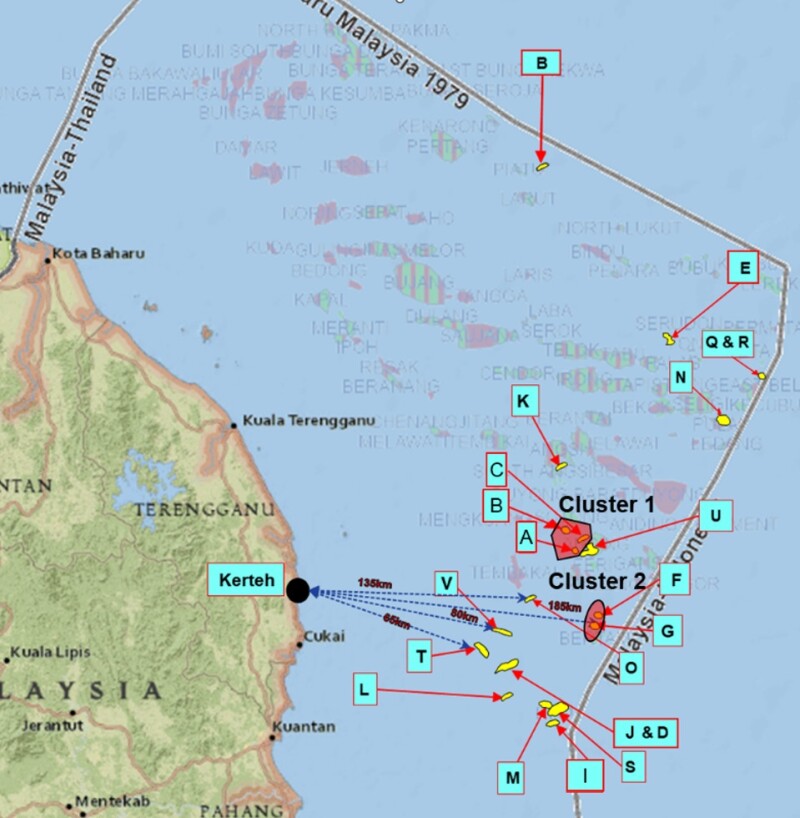Malaysia’s Petronas has signed a joint study and development agreement (JSDA) with the Abu Dhabi National Oil Company (ADNOC) and carbon storage specialist Storegga to evaluate the potential of developing the CO2 storage capabilities of saline aquifers in the Penyu basin, offshore Peninsular Malaysia.
The JSDA, signed on 20 August, envisions construction of at least 5 mtpa of CO2 capture and storage capacity by 2030 with the JSDA’s scope as follows:
- A study of CO2 shipping and logistics
- Geophysical and geomechanical modeling
- Reservoir simulation and containment research
- Application of advanced technologies, including artificial intelligence (AI), to enhance storage capacity
The JSDA builds on a memorandum of understanding (MOU) that Petronas inked in November 2022 with Storegga, an independent developer of carbon storage and clean fuels with offices in the UK and in Houston, to assess the commercial, regulatory, and economic factors required to develop CCS hubs and cluster projects in Malaysia and beyond.
Petronas has been on the hunt for new technology partners. On 28 August, for example, the Malaysian energy major signed an MOU with London-based Carbon Clean, focused primarily on Carbon Clean’s CycloneCC solution, which reduces the total installed cost of carbon capture by up to 50% compared with conventional solutions.
CycloneCC’s compact, modular design occupies up to 50% less space than conventional carbon capture solutions, and the equipment is 10 times smaller. Rotating packed bed (RPB) technology uses centrifugal force to increase the efficiency of the carbon capture process, according to the company.
Malaysia Needs CCS To Offset Emissions From Its Own Rising Gas Production
Malaysia’s push to become a CCS hub is rooted in a strategy of compensating for the country’s growing consumption of natural gas—including the development of new gas fields—with projects that will offset Malaysia’s overall carbon footprint, according to a paper that Petronas presented at the 2023 SPE Offshore Europe Conference and Exhibition in Aberdeen.
In 2021 at COP 26 in Glasgow, Kuala Lumpur had pledged to cut its greenhouse-gas (GHG) emissions by 45% by 2030 based on its gross domestic product and reach net zero by 2050. But because of its growing energy demand, Malaysia will also need simultaneously to develop more new natural gas fields.
After pointing this out, Petronas authors noted in the paper that “to mitigate the negative climatic impact of such developments and manage the huge quantities of produced CO2, CCS is the only viable technology” currently capable of providing the offsets that Malaysia will require.
The authors go on to describe a multidisciplinary subsurface study in 2021 that narrowed a short list of 34 drilled and dry saline aquifers, assessing them using data obtained from well logs and exploration interpretation to determine critical storage features such as reservoir, seal presence and effectiveness, and trap presence (Fig. 1).
“As results, six potential candidates with individual fields’ theoretical storage capacity ranging between 0.5 and 23 Tscf and four fields were identified with mid to high chance of feasibility with individual fields’ storage capacity ranging between approximately 0.05 and 4.6 Tscf,” the author’s concluded. “On top of that, the study also identified opportunities from X, Y and Z fields with theoretical storage capacity ranging between approximately 1.1 and 1.8 Tscf.”

Petronas already operates one of the largest offshore CCS projects in the world, the Kasawari CCS project, which is expected to reduce CO2 volume emitted via flaring by 3.3 mtpa—more than twice the planned injection rate of Norway’s Northern Lights set to begin operations later this year.
The Kasawari project, however, injects CO2 into a depleted gas reservoir, not to be confused with the CO2 storage options in saline aquifers being assessed for development by Petronas and ADNOC as part of a regional hub strategy.
The chief executive officer of Petronas CCS Solutions, Nora’in Md Salleh, said the JSDA signed in August “enhances the established relationship between Petronas and ADNOC, reciprocating Petronas’ presence in ADNOC’s unconventional upstream (oil) business in Abu Dhabi.”
With ambitions to become a leader in the development of CCS projects globally, ADNOC is targeting a carbon capture capacity of 10 mtpa by 2030, the equivalent of emissions from 2 million internal combustion vehicles, according to the company.
ADNOC, Santos Team Up With Similar Visions for CCS in Asia Pacific
In November 2023, ADNOC signed a strategic collaboration agreement with Australian oil and gas exploration and production company Santos to explore possibilities of setting up a decarbonization services platform across the Asia Pacific region through
- Collaboration on the development of CCS technologies
- Joint participation in global CCS projects
- Provision of CCS solutions to emitting companies across Asia, including the development of shipping and transport infrastructure
Santos Energy Solutions Executive Vice President Alan Stuart-Grant said in a news release at the time that the agreement highlighted the globally recognized credibility of Santos’ growing CCS portfolio and the ongoing role for energy companies to deliver real decarbonization solutions to the large energy-consuming economies of Asia.
“There is an enormous opportunity for traditional energy suppliers like Australia and the United Arab Emirates to be at the forefront of helping regional decarbonization through utilization of our natural competitive advantages in carbon storage and energy supply chains,” Stuart-Grant was quoted as saying.
Santos has a three-hub CCS strategy with the Moomba CCS project on track for first injection in 2024, front-end engineering and design at Bayu-Undan CCS (offshore Timor-Leste) nearing completion, and plans for Reindeer (offshore Western Australia) progressing.
FOR FURTHER READING
SPE 215531 CO2 Storage Potential Evaluation of Restricted Saline Aquifers in Peninsular Malaysia Offshore
by Debasis P. Das, Pankaj K. Tiwari, M. Zahari B.A. Rahman, et al., Petronas.


